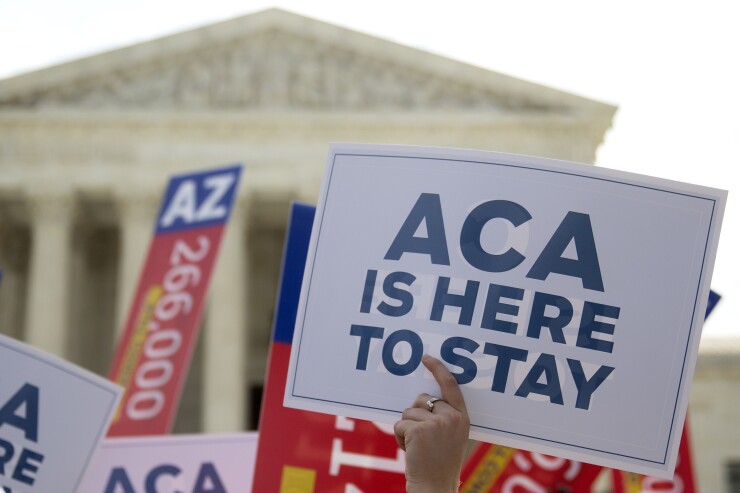The Supreme Court decision in Texas v. U.S. has dismissed the challenge to the Affordable Care Act, rendering useless many “protective refund claims” that taxpayers filed.
At issue in the case was the constitutionality of the individual mandate, passed as part of the Patient Protection and Affordable Care Act in 2010. This wasn’t the first time the ACA survived a challenge. In 2012 in National Federation of Independent Business v. Sebelius, the Supreme Court held that the ACA was a valid exercise of Congress’ taxing power because the provision offered individuals a lawful choice between purchasing insurance and paying a tax, called the “shared-responsibility payment.”
In December 2017, Congress eliminated the act’s monetary incentive to purchase insurance by reducing the shared-responsibility payment to zero. With the elimination of the shared-responsibility payment, Texas and 19 other states and two individual plaintiffs filed a complaint alleging that the law’s individual mandate is unconstitutional and that, since the rest of the act’s provisions are inseverable from the individual mandate, they must also be unconstitutional. In a 2-1 decision, the Fifth Circuit Court of Appeals held that the plaintiffs had standing (a legal right to bring the case) and that Section 5000A, the requirement to maintain minimum coverage, is unconstitutional. The Supreme Court agreed to hear the case.
At stake for taxpayers were two tax provisions enacted as part of the ACA: the additional Medicare tax of 0.9% on earned income in excess of $200,000 ($250,000 for joint filers); and the net investment income tax of 3.8% on net investment income on taxpayers with investment income over $200,000 ($250,000 for joint filers).
On June 17, 2021, the Supreme Court ruled that Texas and the other plaintiffs in the case lacked standing to challenge the constitutionality of the individual mandate. The individual mandate is constitutional since it does not alter legal rights and therefore does not need to be grounded in a constitutionally enumerated power.

Had the Supreme Court ruled in favor of the plaintiffs, taxpayers would have been able to file amended returns seeking refunds of the taxes they paid, so long as they did so within the statute of limitations, according to Larry Pon, a Redwood City, California, CPA.
“Many of our clients filed protective refund claims last year in the hope the ACA would be ruled unconstitutional,” he said. “Now, with the decision of the Supreme Court, those claims are meaningless."
“Notices are now coming back from the IRS about these refund claims. This has nothing to do with the Supreme Court, but is an indication of how long it takes for the COVID-challenged IRS to respond,” he said. “One letter — for a return that I didn’t do — was Letter 916C. It was for a client who filed a protective refund claim that did not apply to them. Another letter — also for a return I didn’t do — was Letter 105C. It was for a refund claim for 2016, which is outside the statute of limitations.”
“Last year and this year were incredibly difficult tax seasons,” said Pon. “A lot of preparers last year were scrambling to file protective refund claims. We knew it was on the Supreme Court docket, and many professionals advised their clients to file these claims. I provided my clients with a simple form they could use to claim the refund, if they insisted. I didn’t do it myself or charge for it.”
“Some practitioners promoted the protective refund claim to those with high income that could be significantly affected,” he said. “The concern is when a client comes back and asks for a refund from the preparer, because they spent a lot of money for something that went nowhere. The professional should be prepared to explain that the reason for filing the claim was because they — the client — insisted on it, with the possibility of saving a significant amount on their taxes if the decision went the other way.”





